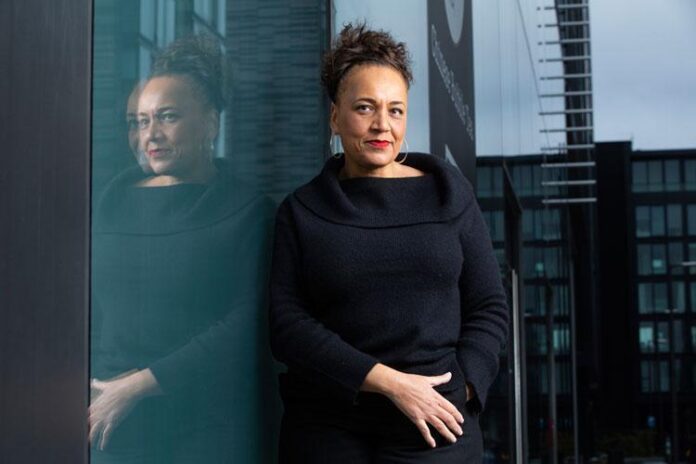The Italian government has stopped three Ghanian curators from entering Italy in order to attend the Venice Architecture Biennale (20 May-26 November). The curators were travelling to the Italian city to work for Lesley Lokko, the first curator of African descent to oversee the prestigious event.
Under Lokko’s direction, more than half of the participants at the 2023 edition of the Biennale are from Africa or the African Diaspora. The overall theme of biennale is titled Laboratory of the Future.
The curators were denied visas due to unfounded concerns they will attempt to abscond the event and illegally enter Italy, according to Lokko. “Not all teams are equal,” Lokko remarked in her opening press conference. She went on to call the exclusion of her Ghanian colleagues a symptom of the “ugly rear” of Italian immigration policy. But hoped the news would not overshadow the opening of the Biennale: “For the moment, this is a headline story, but it cannot become the defining story of this exhibition,” she said. “That’s too easy, too predictable, too cheap.”
The three men had their visas denied by the Italian Ambassador to Ghana, Daniela d’Orlandi, who has publicly accused Lokko of trying to bring “non-essential young men” into the Schengen area of Europe.
In a statement that was shared on Twitter, Lokko described d’Orlandi as an “ambitious career diplomat looking to make her mark with a right-wing government”—a reference to Italy’s new ruling coalition government led by the populist prime minister Giorgia Meloni, who was elected to power in October 2022 on a stringent anti-immigration platform.
“The rejection document from the Italian Embassy in Accra states ‘there are reasonable doubts as to your intention to leave the territory, or state, before the expiry of your visa’,” she said at the press conference. “No explanation has been given to what the doubts were, reasonable or otherwise.” The Biennale confirmed to The Art Newspaper that return flights to Ghana had been booked for each of the curators in question.
Lokko’s staff were employed by the African Futures Institute, an initiative funded by a consortium that includes the Ford Foundation, the Mellon Foundation and Bloomberg Philanthropies.
In response to a request for comment from The Art Newspaper, a spokesperson for the African Futures Institute said: “We do not want to allow this issue to detract from the hard work and effort that the other collaborators/participants have put into the Exhibition over the last 18 months, nor take away from the successes of the Golden Lion Awards recipients.”
In a lengthy statement shared with The Art Newspaper, d’Orlandi said that the vast majority of African artists who applied for visas in order to attend the Biennale were granted them.
“Our Embassy is deeply committed to promoting collaboration with Ghana in all sectors, including the cultural one, and we spare no effort to facilitate the participation of Ghanaian artists in important art exhibitions or events scheduled in Italy,” d’Orlandi wrote.
The Italian government, she said, had to comply with stringent European Union regulations which led to the refusal of a visa to the three Ghanian curators in question.
“It would be restrictive to dwell only on a few visa refusals, which derive from the application of legislation that Italy and the other Schengen countries are required to observe,” she said in the statement.
On Twitter, architecture critic Olly Wainwright, who writes primarily for The Guardian newspaper, described d’Orlandi’s decision as “sickening”.
According to senior figures in the architectural industry, this is not the first time the Italian government has apparently discriminated against African entrants to the Venice Biennale.
Hannah La Roux, a Johannesburg-based architect and an associate professor at Wits University, said in a tweet: “[This is] not news to those of us who hold an African passport. Bottom line is three months salary slips, proof of 100 euros per day, 600K medical insurance along with formal invitations. And once in, we cannot invite dependents to join us.”
Killian Doherty, an architecture lecturer at the Edinburgh College of Art, wrote in a tweet: “Not much has changed in 10 years. In 2012, I secured external funding for visas, travel and accommodation to take two female Rwandan architectural students of mine to see the Venice Biennale. The Italian authorities refused them entry as a ‘high risk of flight’.”
In a statement provided to The Art Newspaper, a spokesperson for the Venice Biennale said:
“We believe it is important to clarify that Lesley Lokko, in her role as the director of AFI—African Future Institute of Accra in Ghana—and in agreement with La Biennale di Venezia, asked her collaborators, who have worked in various capacities to build the 18th International Architecture Exhibition of which she is the curator, to be on site in Venice for the first trial days of the exhibition, a significant moment that concludes the job to which they have dedicated their work with great passion and commitment over the past months.
“We applied for six visas for them as direct collaborators, as is routine for all collaborators. Lodging had been found for all of them in Venice, and return tickets to Ghana already reserved. The visas were denied to three of the collaborators, and one of them is still awaiting a response. We are currently in contact with the competent authorities to find a solution.”

























